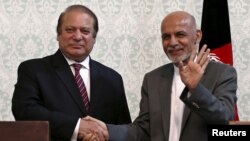Leaders of Afghanistan and Pakistan are expected to hold an “icebreaking” meeting on the margins of the U.N. climate change summit that starts Monday in Paris.
Pakistani officials and a group of senior Pashtun nationalist leaders, who returned Sunday from Afghanistan, told VOA that Afghan President Ashraf Ghani has agreed to meet with Pakistani Prime Minister Nawaz Sharif in Paris, breaking a deadlock in relations.
The two sides are expected to discuss ways to ease bilateral tensions and jointly work for the resumption of stalled peace talks between the Afghan government and Taliban officials, they added.
“The meting is likely in Paris on the margins of [the] climate change conference,” Pakistani foreign ministry spokesman Qazi Khalilullah told VOA.
Pakistan negotiated and hosted a single groundbreaking meeting between Taliban and Afghan delegates in July in an effort to help bring an end to the 14-old conflict in Afghanistan.
But the nascent peace process was disrupted when it was revealed days later that reclusive, longtime Taliban leader Mullah Omar had died two years ago.
Since then, the insurgent group has increased attacks across Afghanistan, and Afghan leaders, including Ghani, increasingly blame Pakistan for being behind the violence, charges Islamabad rejects.
While the Pakistani government was working through official diplomatic channels to arrange the Ghani-Sharif meeting, the breakthrough was apparently made possible by the Pashtun delegation that was invited to Kabul by President Ghani to discuss ways to ease tensions and move the Afghan reconciliation process forward.
A member of the delegation, Afrasiyab Khattak, told VOA Sunday that Ghani accepted their request to meet with Sharif.
“They had their reservations after the collapse of the last process [of talks between Taliban and Afghan officials], but we just requested them to open the gate for talking,” Khattak said.
The Pashtun ethnic group has sizable populations in both Afghanistan and Pakistan.
Afghanistan alleges that Taliban commanders and fighters use Pakistani soil for plotting and conducting insurgent activities on its side of the border.
Islamabad insists it has long abandoned that policy and is using its influence, though limited, to persuade the insurgents to end fighting and open reconciliation talks with the Afghan government, saying instability in the neighboring country also threatens Pakistan.
President Ghani has also been under rising criticism at home for failing to contain the Taliban insurgency, which has greatly expanded its areas of activity during this fighting season.
